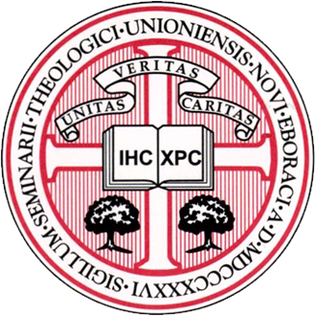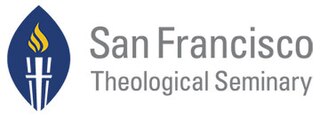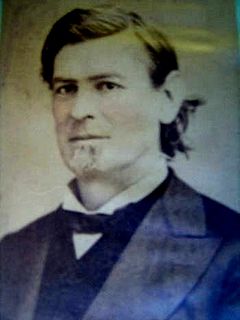
The Cumberland Presbyterian Church is a Presbyterian Christian denomination spawned by the Second Great Awakening. In 2015, it had 70,810 members and 709 congregations, of which 51 were located outside of the United States. The word Cumberland comes from the Cumberland River valley where the church was founded.

Union Theological Seminary in the City of New York is an independent non-denominational, seminary in the Christian tradition, located in New York City. It is the oldest independent seminary in the United States and has long been known as a bastion of progressive Christian scholarship, with a number of prominent thinkers among its faculty or alumni. It was founded in 1836 by members of the Presbyterian Church in the U.S.A., but was open to students of all denominations. In 1893, Union rescinded the right of the General Assembly of the Presbyterian Church to veto faculty appointments, thus becoming fully independent. In the 20th century, Union became a center of liberal Christianity. It served as the birthplace of the Black theology, womanist theology, and other theological movements. Union houses the Columbia University Burke Library, one of the largest theological libraries in the Western Hemisphere.

Princeton Theological Seminary (PTS) is a private, nonprofit, and independent graduate school of theology in Princeton, New Jersey. Founded in 1812 under the auspices of Archibald Alexander, the General Assembly of the Presbyterian Church, and the College of New Jersey, it is the second-oldest seminary in the United States. It is also the largest of ten seminaries associated with the Presbyterian Church (USA).

Columbia Theological Seminary is a Presbyterian seminary in Decatur, Georgia. It is one of ten theological institutions affiliated with the Presbyterian Church (USA).
The Presbyterian College/Le Collège Presbytérien, 3495 University Avenue, Montreal, Quebec, is a Theological College of the Presbyterian Church in Canada, and is affiliated with McGill University through its Faculty of Religious Studies. The Presbyterian College's student base comes from across Canada and around the world.

Iain Richard Torrance, is a Church of Scotland minister, theologian and academic. He is Pro-Chancellor of the University of Aberdeen, Dean of the Chapel Royal in Scotland, Dean of the Order of the Thistle, Honorary Professor of Early Christian Doctrine and Ethics at the University of Edinburgh, President and Professor of Patristics Emeritus at Princeton Theological Seminary, and a Chaplain-in-Ordinary to Her Majesty Queen Elizabeth II in Scotland. He is a former Moderator of the General Assembly of the Church of Scotland. He is married to Morag Ann, whom he met while they were students at the University of St Andrews, and they have a son, Hew, and a daughter, Robyn.
Cumberland Presbyterian Center is the denominational headquarters of the Cumberland Presbyterian Church, located in Memphis, Tennessee.
Robert McAfee Brown was a Presbyterian minister, a theologian, and an activist.
The Rev. Dr. Daniel J. Earheart-Brown is the president of Memphis Theological Seminary. He also serves as Professor of Theology. Earheart-Brown was ordained by the Cumberland Presbyterian Church and served in several pastorates before being named to the seminary's highest position. He attends Faith Cumberland Presbyterian Church in Bartlett, Tennessee. Cumberland Presbyterian clergy are members of presbyteries not individual congregations.
James Wade Knight was a Cumberland Presbyterian minister. He served as that denomination's first Director of Ministry and was the Executive of Kentucky Synod.
Thomas Hardesty Campbell was a Cumberland Presbyterian minister, a former president and dean of Memphis Theological Seminary, and a former director of the Historical Foundation of the Cumberland Presbyterian Church. Campbell retired from the seminary in 1974 and served seven years as pastor of the Harrison, Arkansas, Cumberland Presbyterian Church. He was moderator of the General Assembly of the Cumberland Presbyterian Church in 1973, and was a member of White River Presbytery, in Arkansas, for many years.
Beverly St. John (October 14, 1918 - May 18, 2017 was an elder in the Cumberland Presbyterian Church and served as that denomination's first female moderator of the General Assembly in 1988. The Cumberland Presbyterian denomination had been the first Presbyterian body to ordain women as clergy beginning with Louisa Woosley in 1889. St. John also authored a collection of essays for parents of small children, As the Twig is Bent, in the mid-1960s, and co-authored a book of poetry with Rev. James Knight, "The Prophet is a Snow Man" in 1986.
John Haddon Leith was a Presbyterian theologian and ordained minister who was the Pemberton Professor of Theology at Union Theological Seminary in Virginia from 1959 to 1990. He authored at least 18 books and countless essays on Christianity, over the years moving from a moderate to a strongly critical, conservative perspective on the Presbyterian Church (USA).

The San Francisco Theological Seminary (SFTS) is an American graduate school affiliated with the Presbyterian Church (U.S.A.) located in San Anselmo, California. The seminary was a founding member of the Graduate Theological Union (GTU) in Berkeley, the largest consortium of graduate schools and seminaries in the United States.
Benjamin Wilburn McDonnold, D.D., LL.D. was a Presbyterian minister, writer and educator. He was the third President of Cumberland University, and wrote the History of the Cumberland Presbyterian Church.

Joseph Ruggles Wilson Sr. was a prominent Presbyterian theologian and father of President Woodrow Wilson, Nashville Banner editor Joseph Ruggles Wilson Jr., and Anne E. Wilson Howe. In 1861, as pastor of the First Presbyterian Church in Augusta, Georgia, he organized the General Assembly of the newly formed the Presbyterian Church in the United States, known as the Southern Presbyterian Church, and served as its clerk for thirty-seven years.
Robert Gibson Rayburn was an American pastor and college president.
Robert Franklin Bunting (1828–1891) was an American Presbyterian minister and Confederate chaplain.










